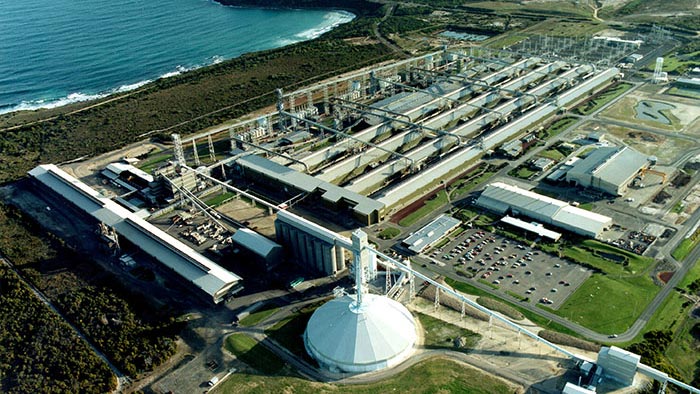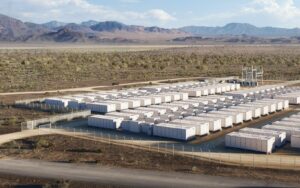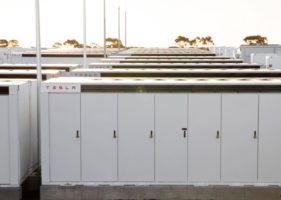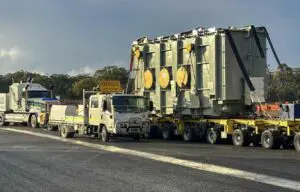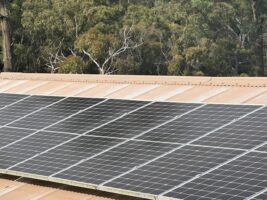Researchers claim to have finally devised a way for Australia’s energy-gobbling alumina-making industry to achieve net-zero emissions through a range of new technologies and by replacing widespread reliance on fossil fuels with renewable energy.
Reductions in emissions could start in as little as four years and reach net zero by 2050, though significant cross investment from within the industry and by government is being called for to allow for the uptake of 3-5 GW of new firmed renewable generation and other infrastructure for the transition to succeed.
Australia has set a target to achieve overall net zero emissions by 2050 but will likely need to reach that level much earlier to keep in line with efforts to cap global warming at 1.5°C.
Alumina, derived from bauxite, is the precursor to aluminium and alumina refining is an energy and emissions intensive step in making aluminium.
The industry contributes three per cent of Australia’s total emissions and consumes over 221 petajoules of energy each year, more than the total energy consumption of Tasmania or the Northern Territory. Roughly 95 percent of emissions are from the onsite consumption of fossil fuels for process heating.
Compared to bauxite production and aluminium smelting, the abatement pathway for alumina refining in Australia has been less clear and long seen as a ‘hard-to-abate’ industry due to a lack of commercially feasible and technically advanced low emissions alternatives.
Its traditional refining processes rely on the combustion of fossil fuels for process heat and there is a lack of low emissions alternatives that are technically mature and commercially feasible.
But now, says the Australian Renewable Energy Agency (Arena) in an industry report released on Wednesday, a credible pathway to achieving net zero emissions by mid-century exists.
The report titled ‘A Roadmap for Decarbonising Australian Alumina Refining’ was commissioned by ARENA and prepared by Deloitte in consultation with Australia’s three major alumina producers: Alcoa, Rio Tinto and South32.
The report’s authors identify four key decarbonisation technologies that could transform the way refineries consume and use energy by enabling the uptake of renewable energy and removing the use of fossil fuels.
The technologies are mechanical vapour recompression (MVR), electric boilers, electric calcination, and hydrogen calcination. In combination, these four technologies have the potential to reduce emissions from Australia’s six alumina refineries by up to 98 per cent, according to Arena.
It says that these technologies are at varying stages of advancement and will require significant investment to support development and implementation.
The report stresses there is no one-size-fits-all approach and individual refineries will require different combinations of technologies to achieve net zero.
An early deployment of electric boilers and MVR could result in emissions reductions from 2027, while hydrogen and electric calcination technologies are anticipated to be deployed from the mid 2030s, according to the report.
The report also highlights critical challenges ahead.
These technologies require broader ecosystem development to enable uptake including 3-5 GW of new firmed renewable generation, new transmission infrastructure, large scale renewable hydrogen supply chains and market and regulatory frameworks that support decarbonisation, according to the report.
Much of Australia’s alumina industry has already outlined plans to source renewable energy supplies over the next decade, but the report notes that firmed energy supply is essential, either through grid-based firming, on-site thermal energy storage or green hydrogen storage.
The report also notes that the firmed energy and storage requirements for alumina refining could also provide broader ecosystem benefits, such as by enhancing load flexibility in the main grids, and acting as a kind of giant battery through demand flexibility.
Coordinated investment will be also be required from governments and industry to support this transition, the report notes.
“Alumina refining has always been considered a hard-to-abate sector with significant barriers to reducing emissions, Arena CEO Darren Miller said in a statement. “Now, we have Australia’s biggest alumina producers coming together with ARENA to develop a clear and credible pathway to reducing emissions in the industry.”

